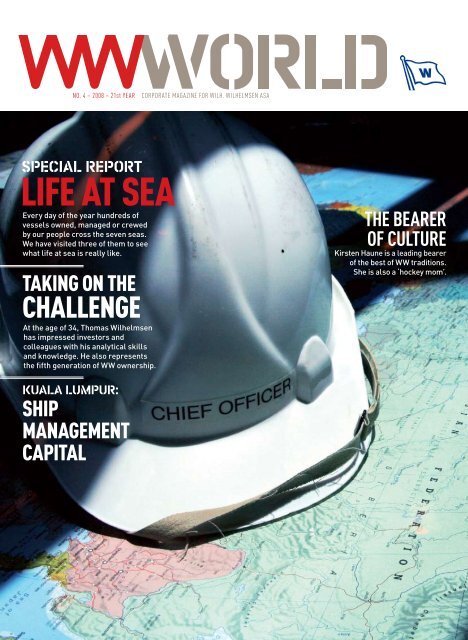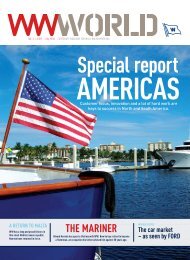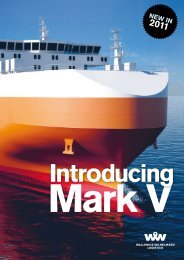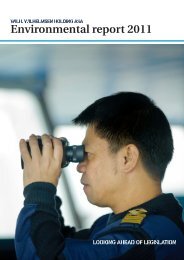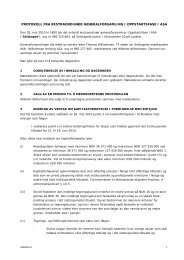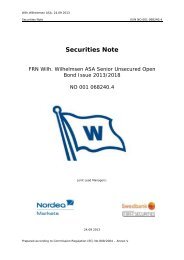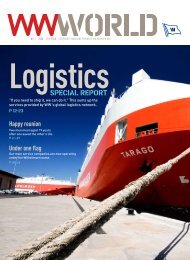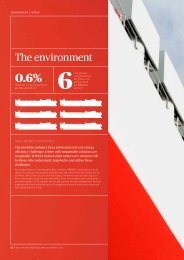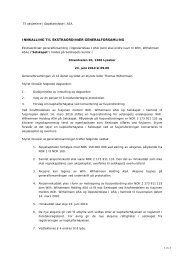WW World 4-2008 - Wilh. Wilhelmsen ASA
WW World 4-2008 - Wilh. Wilhelmsen ASA
WW World 4-2008 - Wilh. Wilhelmsen ASA
Create successful ePaper yourself
Turn your PDF publications into a flip-book with our unique Google optimized e-Paper software.
no. 4 – <strong>2008</strong> – 21st year<br />
corporate magazine for <strong>Wilh</strong>. <strong>Wilh</strong>elmsen <strong>ASA</strong><br />
Special report<br />
life at sea<br />
Every day of the year hundreds of<br />
vessels owned, managed or crewed<br />
by our people cross the seven seas.<br />
We have visited three of them to see<br />
what life at sea is really like.<br />
taking on the<br />
challenge<br />
At the age of 34, Thomas <strong>Wilh</strong>elmsen<br />
has impressed investors and<br />
colleagues with his analytical skills<br />
and knowledge. He also represents<br />
the fifth generation of <strong>WW</strong> ownership.<br />
THE BEARER<br />
OF CULTURE<br />
Kirsten Haune is a leading bearer<br />
of the best of <strong>WW</strong> traditions.<br />
She is also a ‘hockey mom’.<br />
kuala lumpur:<br />
ship<br />
management<br />
capital<br />
<strong>WW</strong>WORLD.4.<strong>2008</strong> 1
Special report:<br />
life at sea<br />
welcome<br />
on board<br />
<strong>WW</strong> <strong>World</strong>’s Stacey Trodal tested her<br />
sea legs onboard MV Tortugas from<br />
Singapore to Sri Lanka. Here is her<br />
report on life on board, seen through<br />
the eyes of a ‘rookie sailor’.
Special report:<br />
life at sea<br />
sailing m/V tortugas<br />
TANK INSPECTION: Tortugas’ chief officer, Ove Myrstad, climbs<br />
down into the ballast water tanks for a quick routine check.<br />
Life on the<br />
SPORTY CREW: Deck vs. engine crew meet for a friendly game of basketball on the specially built court on the ships upper deck.<br />
OFF SINGAPORE: MV Tortugas bunkers outside the Port of<br />
Singapore before her onward voyage to Europe via Suez.<br />
Life at sea involves weeks<br />
and sometimes months<br />
away from family and<br />
friends. As many of the<br />
crew on board MV Tortugas<br />
will tell you, being a seaman<br />
is more than just a job – it’s<br />
a lifestyle.<br />
Text and photo: Stacey Trodal<br />
<strong>WW</strong> WORLD’S REPORTER: Safety first. It’s a requirement<br />
that all crew including <strong>WW</strong> <strong>World</strong>’s reporter, Stacey<br />
Trodal, undergo some safety training when joining the ship.<br />
T<br />
he Strait of Malacca: It’s 4 am and<br />
M/V Tortugas’ chief officer Ove Myrstad<br />
is on the ship’s bridge starting his navigational<br />
watch. He is joined by captain<br />
Pål Myre. Outside only the lights from anchored<br />
ships illuminate the night. The ship has just finished<br />
bunkering off Singapore and is continuing<br />
her westward voyage via Suez to Europe.<br />
The positive weather forecast just received from<br />
the satellite is the last thing on the crew’s mind.<br />
There are more pressing preparations that will<br />
need to be made for the voyage ahead. The Strait<br />
of Malacca is one of the busier shipping lanes<br />
in the world with more than 50 000 vessels on<br />
average passing through every year. It is also an<br />
area known for piracy, which means Tortugas 24<br />
manned crew will be placed on a 24 hour round<br />
the clock watch.<br />
Another day at the office. Armed with a<br />
flashlight and walkie-talkie, Ove climbs down<br />
into the ballast water tank. The tanks have to be<br />
regularly inspected for rust. It’s a hot and dangerous<br />
job. Next to the open hatch one of the crew<br />
waits with two oxygen tanks. The minutes pass by<br />
and he becomes restless. Ove isn’t answering on<br />
his walkie-talkie.<br />
The man looks at his watch and tries the walkietalkie<br />
again. No answer. He dips his head down<br />
into the dark room searching for Ove. The light<br />
from Ove’s flashlight appears in the distance.<br />
It must be more than 31 degrees in the ship’s<br />
forward holds and my blue coveralls are already<br />
drenched with sweat.<br />
Back in his cabin on the upper deck Ove sits<br />
comfortably in his brown leather recliner in front<br />
of the TV for a short break. He has swapped his<br />
sweat soaked blue coveralls for t-shirt and shorts.<br />
You could easily be thinking that the cabin was<br />
onboard a passenger vessel. The 30 sq meter officer<br />
quarters boasts plush carpet, a separate bedroom,<br />
bathroom and office area. On the peach coloured<br />
wall hangs a framed picture. The only noise is the<br />
hum of the air-conditioning system, which holds<br />
the cabin temperature at a comfortable 21 degrees.<br />
The captain’s scratchy voice over the two-way sitting<br />
on the coffee table breaks the silence.<br />
Ove answers before replacing the radio back.<br />
“Even if you’re off duty you know in the back of<br />
your mind that something will happen soon.<br />
You’re never really off duty or off for the weekend.<br />
I can get a call at 3 am on a Sunday morning following<br />
the end of a previous watch. It’s extremely<br />
difficult to separate work from your own time<br />
when your office is just outside your cabin door.<br />
Sometimes you find yourself working four days in<br />
a stretch, particularly when the ship is in port. It’s<br />
hectic, but it also makes time pass quicker, which<br />
is great.”<br />
As second in command, the 34-year-old<br />
Norwegian chief officer is faced with a varied<br />
number of tasks every day. This can include<br />
anything from checking the cargo lashings to<br />
working through a daily mountain of paperwork.<br />
It’s not a job for anyone who needs eight hours<br />
of sleep.<br />
”I usually start my day at 4 am on the bridge<br />
with a navigational watch. Then around 6 am I’m<br />
joined by the bosun to discuss the schedule and<br />
"It’s extremely difficult to<br />
separate work from your own<br />
time when your office is just<br />
outside your cabin door."<br />
Ove myrstad, chief officer<br />
ongoing tasks for the deck crew. This loosely follows<br />
the weekly and quarterly maintenance plans<br />
for the ship. At around 8 am each morning I leave<br />
my watch at the bridge to eat breakfast with the<br />
captain and chief engineer. It’s an easy and good<br />
way to talk shop. Then I will usually stay in my<br />
office until lunch.”<br />
He carries a lot of responsibility on his shoulders.<br />
Not only is he accountable for the care of<br />
cargo during the voyage, but also the welfare<br />
and safety of the crew. When asked if he can see<br />
himself eventually in a 9 to 5 office job, a smile<br />
quickly breaks across his face as he looks out to<br />
sea through one of the portholes.<br />
“No – I don’t think I can ever see myself doing<br />
that. I’m too restless. It’s hard to explain but I<br />
need to feel like I’m moving towards something.<br />
I need the change. Besides, it’s in my blood so to<br />
speak. Both my parents worked and met on a<br />
<strong>Wilh</strong>elmsen ship.”<br />
He pauses before adding jokingly: “When I<br />
first became interested in becoming a<br />
sailor my father threatened to kick me<br />
out of the house if I decided to work for<br />
anyone else than <strong>Wilh</strong>elmsen. He still<br />
has his blue stripes hanging up in his<br />
cupboard.”<br />
As many sailors have said before, the<br />
job requires some sacrifice. “I must admit it’s hard<br />
enough now being away from my wife Joyce for<br />
two to three months at a stretch. I think it will<br />
be even more difficult the day we have kids. All<br />
the same you work for a purpose and try to help<br />
give your family a good life, while managing to<br />
do something you enjoy doing.”<br />
“Keeping in touch is a lot easier now that the<br />
V-SAT satellite communication system has been<br />
installed. I can speak with Joyce for the cost of a<br />
local Norwegian phone call. Also we e-mail each<br />
other a lot. Sometimes I have the opportunity to<br />
bring Joyce on different legs of the voyage which<br />
makes a big difference,” says Ove.<br />
Keeping your sanity. It’s hovering around<br />
33 degrees as Tortugas enters the Bay of Bengal.<br />
The 500-mile journey through the strait has gone<br />
problem free and some of the ship’s Filipino crew<br />
can finally take a well-earned break. The effect of<br />
my sea sickness tablets has worn off and I feel less<br />
like a zombie as I head out onto the open deck.<br />
The temperature difference between the upper<br />
cabin and outside hits you in the face like a wet<br />
cloth.<br />
Outside two of the deck crew are painting one<br />
of the winches. From top to toe they are covered<br />
in fabric. Even their eyes are hidden by sunglasses<br />
and a welding hat. Ove informs me that this is one<br />
of the ongoing tasks that never stop. Preventing<br />
rust can lengthen the ship’s life by at least 20<br />
years. The clothes are a necessary measure against<br />
sunburn.<br />
On the starboard deck ten crew members are<br />
playing basketball on the specially built half<br />
court. They have swapped their blue coveralls for<br />
18<br />
<strong>WW</strong>WORLD.3.<strong>2008</strong><br />
<strong>WW</strong>WORLD.4.<strong>2008</strong> 19
Special report:<br />
life at sea<br />
sailing m/V tortugas<br />
NORWEGIAN FARE: The ship’s cook, Reggan Fernandez, flips through his Norwegian cookbook.<br />
TORTUGAS’ ELVIS: During the day Eduardo De Leon (Eddy)<br />
works as the ships fitter. At night he swaps his blow torch for<br />
an electrical guitar to provide the crew with some well<br />
needed entertainment.<br />
SEALINK: The satellite communication system<br />
connects Tortugas to the Internet.<br />
MASTER AND COMMANDER: Pål Myhre has witnessed a<br />
revolution in shipping technology since he first joined<br />
the world fleet 40 years ago.<br />
STORES ON BOARD: Supplies are lifted on board in Singapore via the ship’s crane as a one of the deck crew supervises.<br />
The crane is used for spare parts and provision handling and has the capacity to load 5 tons of supplies at a time.<br />
"Sometimes when you<br />
come home the kids are<br />
a little shy and it takes<br />
time for them to get to<br />
know you again"<br />
eduardo de leon, fitter<br />
American basketball singlets. The humidity and<br />
temperature doesn’t seem to dampen their spirits<br />
as they jostle one another for the basketball on the<br />
ship’s spotless white steel deck. Under the shade<br />
of the upper deck’s wall another small group have<br />
gathered to cheer and support. It’s deck versus the<br />
engineering crew and pride is on the line.<br />
Tortuga’s captain knows all too well the necessity<br />
of social activities on board. As the game<br />
continues, Pål Myhre takes over the bridge watch.<br />
The 360-degree view offers perfect visibility as<br />
he surveys the surrounding ocean through his<br />
binoculars. I ask him if the basketball game is a<br />
regular event.<br />
“Yes. We also have a fully equipped gym and<br />
recreational room. Many of the Filipino crew have<br />
been at sea for up to 9 months so it’s important<br />
that they can take time to relax. We also try to organise<br />
the occasional BBQ on deck. It is extremely<br />
vital to create a sense of comradeship among the<br />
crew,” says Pål.<br />
Time changes everything. Pål has had a long<br />
and distinguished career in <strong>Wilh</strong>elmsen. He can<br />
count the number of <strong>Wilh</strong>elmsen ships he hasn’t<br />
sailed on in one hand. Back home in Norway he<br />
has a picture of every vessel he has ever mastered<br />
displayed on the mantle over the fireplace. He has<br />
seen a lot of change and has many stories from his<br />
time at sea to share.<br />
“There has been so much change within the<br />
fleet since I joined <strong>Wilh</strong>elmsen in 1966. For<br />
one thing, we were all Norwegians then. The<br />
contract system has also changed. We had one<br />
year contracts, which later became 9 months, then<br />
down to 6 months and so on. This is the younger<br />
generation. If you want a life at home you need the<br />
shorter periods. Now we are down to 2 months on,<br />
2 months off. For me it has become a lifestyle. The<br />
whole family gets into some kind of on/off routine<br />
for certain periods.”<br />
Pål guides me though the bridge explaining the<br />
function of each of the buttons and the complex<br />
computer systems.<br />
“We have been through a revolution – since I<br />
first went to sea 40 years ago – especially when it<br />
comes to the navigational equipment. Today we<br />
have all the latest technology. When I started as<br />
a third mate, navigation was done by a sextant, a<br />
chronometer and navigation tables. Everything<br />
was done by hand,” he explains.<br />
Even the living conditions have changed.<br />
“Today we have all the comforts of home. When I<br />
first began there were at least two men to a cabin<br />
with concrete floors and communal showers. The<br />
food was pretty good – we had Norwegian cooks,<br />
although it doesn’t say anything about the quality<br />
of the food,” he adds with a grin.<br />
A taste of home. The smell of brown sauce, fish<br />
and meat rissoles fills the upper deck and living<br />
quarters. Inside the galley the clatter of pans can<br />
be heard as the cook, Reggan Fernandez, and his<br />
assistants prepare the crew’s dinner. On one of<br />
the stainless steel bench tops Reggan leans over<br />
and studies a recipe in his Norwegian cook book.<br />
Tonight he is pulling out all stops for the ship’s<br />
guests, with a feast of Norwegian specialties<br />
like salted meat and pork with pea soup, potato<br />
dumplings or “raspeball” and sausages.<br />
The mess is just as impressive and feels more<br />
like a dining room. Those not on duty are now<br />
dressed in their causal clothes, seated around the<br />
round tables. Light from the port holes floods<br />
across the scene as loud chatter and laughter fill<br />
the room.<br />
Food is important for the crew and especially<br />
for the captain. Every day like clockwork, the<br />
crew are served three good meals, plus morning<br />
and afternoon tea or coffee. Long gone are the<br />
days of salted rations and biscuits with weevils.<br />
Ship agents in each port ensure that Tortugas<br />
has everything she needs. Fresh water for showers,<br />
washing and drinking is provided by the sea<br />
water distiller in the engine room.<br />
The Norwegians are normally served Western<br />
food, including toast, eggs and bacon for their<br />
breakfast, while the Filipino crew normally opt<br />
for food more to their liking such as rice and fried<br />
fish. As the captain explains, food can be a source<br />
of much disturbance:<br />
“The last cook we had served pasta with custard.<br />
You have to give the guy credit for creativity but<br />
that was one of the last meals he cooked before<br />
Reggan came onboard as his replacement. We’re<br />
pretty lucky really, there are not too many cooks<br />
in the fleet who can whip up Norwegian specialties<br />
like meatballs and brown sauce or raspeballer.<br />
I don’t think there is anything he can’t cook.<br />
That’s particularly important when you have an<br />
international crew.<br />
When asked if his wife’s cooking is better,<br />
the captain pauses before laughing and adding<br />
that his wife has been onboard and she was also<br />
impressed.<br />
A way of life. Long gone are the days where the<br />
crew could escape the ship’s confines and head to<br />
shore for a couple of days while the ship loaded<br />
its cargo. Today, the process usually takes a few<br />
hours and there is no chance of enjoying time<br />
on land before the ship is on her way again. So,<br />
the crew are left to entertain themselves while on<br />
voyage.<br />
Tonight they fill the couches of the recreational<br />
room. Everyone are smiling and swaying to the<br />
music as Tortugas’ fitter, Eduardo De Leon, plays<br />
out his own rendition of ‘Love me tender’ by Elvis<br />
Presley on his electric<br />
"there are not too many cooks in the fleet<br />
who can whip up Norwegian specialties"<br />
pål myhre, captain<br />
guitar. His smile is infectious<br />
and everyone<br />
is enjoying the show.<br />
He tells me that playing<br />
in the band is one of the things he enjoys most<br />
while on board. Back in Manila he also plays with<br />
a band, but because of the long stints at sea visits<br />
are few and far between.<br />
”I don’t really miss anything apart from my<br />
family and my friends. I try to speak with my<br />
family every day via chat online. Otherwise, when<br />
the system is down we speak on the phone once a<br />
month. Usually I work nine months on board. As<br />
a father it’s very hard as you miss time with your<br />
wife and kids. Sometimes when you come home<br />
the kids are a little shy and it takes time for them<br />
to get to know you again,” says Eduardo.<br />
Like many of the Filipino crew, Eduardo works<br />
abroad to support his family. ”I began as a fitter<br />
in the Philippines but the pay and conditions<br />
were really bad. I applied to be a fitter on a ship<br />
through one of the manning agencies. There is a<br />
big difference with the salary. In Manila I only<br />
got 300 pesos a day, at sea my salary is more than<br />
900.” he says.<br />
This will be his second time onboard Tortugas,<br />
although he started working with <strong>Wilh</strong>elmsen<br />
in 1992.<br />
”The crew are very close, they are like a second<br />
family for me. In our spare time we spend a lot of<br />
time watching videos from home. Right now we<br />
are setting up a network to play EA games, racing<br />
games. Or if the weather is good then we play<br />
basketball,” says Eduardo.<br />
He is looking forward to Europe. Within a<br />
week or two he will be finishing his 9-month stint<br />
onboard Tortugas and head home to his family in<br />
Manila for a couple of months.<br />
20 <strong>WW</strong>WORLD.4.<strong>2008</strong><br />
<strong>WW</strong>WORLD.4.<strong>2008</strong> 21


